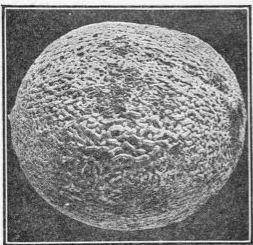509. Climatic Requirements Of Muskmelon
Description
This section is from the book "Vegetable Gardening", by Ralph L. Watts. Also available from Amazon: Vegetable Gardening.
509. Climatic Requirements Of Muskmelon
The muskmelon is much more susceptible to the effects of cold than the cucumber or the squash. It will not stand frost and demands rather high summer temperatures for the most satisfactory results. As a commercial enterprise the crop has been grown most extensively in regions where the seasons are long enough to mature the fruit from seed planted in the open ground. While this is true, hundreds of acres are produced in some sections from plants raised under glass. The crop should never be started in the open until danger of frost is past. The arid regions of the West, as Colorado, Arizona and New Mexico, produce, under irrigation, melons of excellent quality which command high prices on the eastern markets. While climatic conditions of the West are considered unusually favorable, eastern growers have the advantage by their close proximity to the markets. By allowing their melons to ripen on the vines before marketing, they secure as good quality and are enabled to compete successfully with the West. Irrigation or a liberal rainfall is essential wherever the crop is grown.
510. Soil
The character of the soil is probably secondary in importance to climatic conditions. Musk-melons may be grown in any soil skillfully handled. Sandy types, however, have the preference because they produce an earlier crop, and are easier to cultivate than heavy ones. It is believed that the quality of the fruit ranges higher when grown on the lighter soils. Nevertheless, clay and silt loams are often used in the culture of this crop and growers who are farming these lands believe their melons are of superior quality. But the largest areas in the United States are on sandy soils.
The structure of the soil is just as important as the texture. When proper additions of vegetable matter are made to clay lands, they often produce excellent results. New land is considered especially desirable. In any soil a constant and fairly liberal amount of moisture is important throughout the season. Drouth or insufficient soil moisture invariably results in a weak vine growth and in small fruits of inferior quality. Thorough drainage is also important. Alkali lands should be avoided, as they are said to produce melons of comparatively low quality.
511. Seed
Practically all of our muskmelon seed is produced in the United States. Large amounts are grown in California, Colorado, New Jersey and in some parts of the South.
The importance of high-grade seed cannot be overestimated. Vigor of plant, disease resistance, productiveness, quality and uniformity in all respects depend largely upon the skill in selecting seed. The most approved and scientific methods must be employed if advancement is to be made. There will be little or no progress if simply the best specimens are kept for seed without regard to the character or fruiting qualities of the plant from which they have been taken. The entire plant with its product must be considered as the unit.

Fig. 87. ideal netting on netted gem muskmelon.
Hundreds of growers select and save their own seed and the practice is commendable if the work is done with care and intelligence. There is no reason why the growers of any given section should not unite and work together for the improvement of the variety best adapted to local conditions. It would mean greater uniformity in the product marketed and, therefore, higher prices, readier sales and increased demands.
The Indiana Experiment Station
The Indiana Experiment Station suggests the following as the ideal type of the Netted Gem, based partly upon the experience of Colorado growers in selecting Rocky Ford Gems:
Size
Size, slightly less than 5 inches in length and slightly over 4 inches in diameter. This size packs to the best advantage in the standard Rocky Ford crate or "forty-fives." Seed Cavity small and well filled with seed. Flesh thick, light green in color, shading uniformly to a deeper green from the small seed cavity to the thin rind. Netting heavy, well defined and uniform over the whole surface of the melon. A gem of this type will keep longer and ship better than more prominently ribbed types. (See Figure 87.) Flavor, rich, smooth and melting. This flavor is usually found in a melon which meets the other requirements mentioned. Vines should be strong and prolific and should produce as early ripening a product as possible.
Continue to:
Tags
plants, crops, gardening, cultivated, harvesting, food ,greenhouses, fertiliser, vegitables
